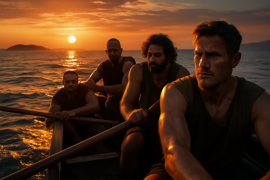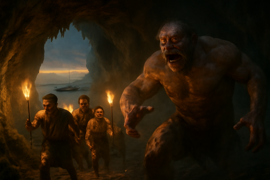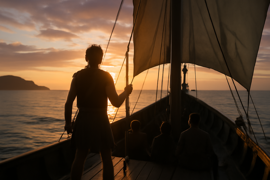Introduction
Odysseus stood at the prow, salt wind whipping his cloak, eyes fixed on a horizon that seemed endless. Behind him lay the smoky ruins of Troy—victory’s bitter aftertaste still clinging to his tongue—while before him stretched an ocean of shifting moods, chartless tempests, and the capricious whims of gods and monsters he had yet to meet. This voyage was no straightforward sail; it would test every seam of his courage, every recess of his cunning, and every beat of his steadfast heart. So began an odyssey that would echo through a thousand generations: the journey of Ithaca’s king striving for home. Through the shifting blue of dawn and the rumble of thunderous skies, Odysseus recalled his wife, Penelope, weaving her tapestry and holding the kingdom against swarms of suitors. He envisioned young Telemachus, uncertain but determined, awaiting word like a beacon of hope. He remembered the fallen comrades whose laughter still haunted empty corners of his mind, and the promise he had whispered to his birthland before ever lifting an oar to war. Now every wave carried the weight of that promise, every breeze whispered challenges from islands unknown. By midday, the ship cleaved through glassy seas, reflecting cloudless heavens, and Odysseus’s crew worked taut ropes with muscle and care. Yet in the hush between gusts, he felt a tremor in the air — the silent approach of divine scrutiny. Behind him, Athena’s guiding light shone invisibly; ahead, Poseidon’s brooding fury churned in unseen depths. The call of unknown shores beckoned — some paved with gold, others draped in shadowy curse. The traveler mariner had become a seeker: seeking safety, reunion, justice, and the simple warmth of hearth and family. That dual blade of hope and dread would drive him through this tapestry of trials, forging a legend that neither time nor tide could ever wash away. Thus, upon that sunlit deck, the seeds of an epic were sown: courage sharpened by divine trials, wisdom distilled from suffering, and a yearning so powerful it would lead a single man through perils unnumbered toward the island he had forsaken only to dream of returning.
The Call of Ancient Winds
The first island rose from mist like a phantom: dark cliffs thrusting skyward, shadowed caves yawning at water’s edge. Odysseus brought his ship to anchor in a sheltered cove framed by pines, their needles whispering secrets in the salt-laden breeze. The men disembarked warily, each footfall echoing across smooth stones, and Odysseus carried the weight of leadership in every measured step. He lit a small offering fire on the shore, scattering petals and pouring milk from a silver flask as a tribute to Athena and the Earth Mother. He spoke aloud: “Great goddess, grant us safe passage, and Earth, bear witness to our reverence.” The crackle of flames answered, then the wind shifted, carrying the scent of unfamiliar blossoms deeper into the island’s forest. They ventured inland beyond mossy earth and creeping bronze vines, swords sheathed, senses sharp. A clearing opened to a pool so still it mirrored the sky—a gem in a ring of emerald ferns. Here, as sunset stained the edges of the world red, the hypnotic call of song drifted across the water. Armed men froze; Odysseus felt that same pull in his bones. It was neither wholly human nor beastly, nor birthed in the wildest imaginings of Ithacan minstrels. It was the lure of something other, something that would test the fiber of their wills. Through the twilight glow, the Sirens revealed themselves as figures of regality and terror entwined, voices weaving promises of knowledge, homecoming, and immortal renown. Odysseus, remembering Circe’s counsel, bound himself to the nearest mast and ordered his sailors to plug their ears with wax. Though wordless, his eyes spoke volumes: “Sail on, no matter the cost.” The ship began its slow revolutions, ropes taut as hearts, until the siren song faded with the shifting current. When the cove fell silent, he summoned his men, chest heaving, eyes alight with fierce triumph and grief for those who wouldn’t make this choice. The island’s shadows closed behind them as they reboarded, and the oars carved lines in the fading orange of dusk. On the horizon, the night sky opened into a million points of light. Odysseus stared upward as though reading an ancient map—stars guiding him beyond illusions toward the course of home. Through that silent night, his thoughts drifted to Ithaca’s rocky shores, to Penelope’s steadfast vigil, and to the hearthstone that glowed in every memory of boyhood and youth. He felt the island’s phantom grief in his veins, and a deeper vow solidified: no song, no storm, no monster could shake him from returning. With each stroke, he wove a new thread into the tapestry of his legend, anchored by an unbreakable will.

Among the oarsmen, quiet conversations stirred: tales of distant storms quelled by quick thinking, of comrades lost to hidden reefs, of visions glimpsed at dawn. Their voices carried both fear and determination—a dual cadence that echoed the captain’s own heart. When dawn crept in from the eastern sky, they glimpsed the ragged outline of a new shore, and hope, brittle yet bright, swelled in every chest.
Trials of Isles and Shadows
As the dawn broke, a mist curled around the ship, chilling the marrow. Sailors pulled coats tight, scanning a coastline shaped like the jaws of a beast. Legends whispered of a giant cyclops dwelling there, one eye blazing with malice. Odysseus felt a shiver that was not of cold—an echo of memories passed down from bards, of nightmare monsters feasting on unwary men. They beached the vessel on a pebbled shore, the only sound the lapping of a restless tide. Odysseus moved first, spear in hand, eyes narrowed. He found a cave-mouth veiled by vines and followed a spoor of broken olive jars and discarded shields. Then he heard it: a growl low and rolling like thunder in a distant cloud. One by one, his men formed a trembling line behind him. Within the cavern lay bones like pale driftwood, shields ripped in half, the odor of rot and oil thick in the air. Long strides carried them deeper until a massive shape stirred in torchlight: the cyclops, foot long as a mast, eye blazing with confusion and rage. Odysseus held his spear steady, voice calm even as his pulse thundered: “Monstrous one, we come unarmed in peace.” The cyclops laughed, a sound that shook loose stones from the ceiling. He seized two men in an iron grip and crushed them like brittle branches. The world narrowed to a fight for survival. Odysseus feigned surrender, befriending the creature’s arrogance, naming himself “Nobody” with a sly twist of tongue. When wine—drugged in secret—dulled the cyclops’s senses, Odysseus and his men drove a sharpened stake into that single glaring eye. The creature’s roar reverberated across rock and reef. Blinded and furious, he bellowed into the night, tearing away the cave’s boulders to trap them inside. Daringly, Odysseus lashed himself to the underbelly of a ram as it streamed into the pasture at dawn. The beast, ignorant of its burden, carried him and his men out to freedom, leaving the cyclops howling with betrayal. But the cost lay heavy: two dozen souls lost to brutish hunger, the stench of spilled blood clinging to every oar. Odysseus staggered onto deck, grief sharpening his eyes into steel. He cursed the arrogance that led him here—and prayed to the gods to temper his pride with prudence. Yet each loss was a lesson carved into his heart: cunning could slay a monster, but only humility could navigate the capricious will of fate. With that knowledge, he plotted a course beyond shorelines and Siren song, steering toward islands where sorcery and storms awaited. Each new challenge would demand not just strength and guile, but a heart tempered by sorrow and hope in equal measure. And so, beneath skies shifting from bruised purple to radiant gold, Odysseus set sail once more, forging onward through the labyrinth of the world and his own restless spirit.

Hours turned to days, and each sunrise brought fresh whispers: tales of an island ruled by a sorceress who could turn men to swine, of ravens that spoke in riddles, of a sea so dark that ships vanished like tears in the wind. His crew, though battered and weary, followed him still—bound by loyalty to their king and to the promise of home. The oars beat a slow rhythm, echoing the pulse of a giant heart beating beneath the endless blue.
On the edge of a cerulean lagoon stood Circe’s palace of white marble and wild gardens. Statues of beasts—lions frozen mid-roar, wolves with glass eyes—guarded a banquet laid out in eternal invitation. Odysseus advanced with caution. He tasted the honeyed wine, charmed the enchantress with words spun like threads of fate, and watched, horrified, as his men succumbed to her magic. Yet love and reason reclaimed their sway when Odysseus, armed with the herb Moly granted by Hermes, resisted her spell. In gratitude she freed the crew, then guided them through the Underworld’s gates to seek counsel from the ghosts of heroes and prophets. Descending into that realm between worlds, Odysseus spoke with shades of Achilles and Agamemnon, gleaned warnings of Scylla and Charybdis, and learned which individuals he must spare or suffer to leave Avalon’s dark waters behind. He rose from the Styx reborn in purpose, bearing the weight of knowledge that would shape each oarstroke, each prayer, each decision onward.
Homeward Bound Through Storm and Faith
With new warnings etched on his soul, Odysseus steered westward, toward seas that churned with the promise of home and the threat of final reckoning. He carried Circe’s counsel like a map of faith and fear: navigate Scylla’s six heads, avoid Charybdis’s whirlpool, and never stray from the gods’ counsel lest his voyage end forever. A drenching storm birthed by Poseidon struck without mercy. Waves towered like mountains of ink, and thunder cracked as though the sky itself shattered. Odysseus barked orders above the roar, the deck slick with salt and blood. The crew lashed themselves to mast and railing; oars snapped like brittle reeds. Amid the chaos, he glimpsed the swirling maw of Charybdis—a whirlpool that seemed to suck the world’s edges into darkness. Holding steady, he guided the ship toward jagged cliffs where Scylla lurked, six snarling maws waiting to snatch any who drew near. Screams echoed as the monster struck, ripping men from the deck in a single motion. Odysseus’s heart shattered as each friend was lost. Desperation lent him unnatural calm: he urged the ship forward, trading the certainty of confrontation with Scylla for a narrow path through cyclone seas. As the hull scraped past her final head, he felt the thunder of the sea god’s rage in every timbre of wind. When dawn broke upon the survivors, they found themselves drifting toward a tranquil isle, its white sand rimmed by turquoise waters and palms swaying softly. There stood young Athena, disguised as a shepherd girl, guiding them to fresh water and shade. In her quiet strength, Odysseus saw the reflection of every trial borne and victory earned. He recognized then that his journey, though crowned with sorrow, had tempered his spirit. He would step onto Ithaca’s soil an altered man: wiser, humbler, and more resolute than any king who came before. Leaving the isle’s peaceful hush, he charted the ship northward, skirting siren coasts now remote in legend and memory. The wind carried scents of home: wild thyme, olive groves, and distant hearth fires. His map etched in stars and loss, he guided each stroke with prayer and remembrance. At last, Ithaca’s coast emerged from the drifting haze—jagged rocks and pine-clad hills familiar as a father’s face. Heart pounding, Odysseus inhaled the fragrance of land. Penelope’s loom flickered in his memory, Telemachus’s hopeful gaze, and the crest of his father’s simple hearth waiting like an old friend. He moored in secret, disguised as a wanderer, testing loyalties and plotting his return. Step by step, he reclaimed his home: sparring with beggars, sharing tales at the palace gates, observing suitors grown fat on his absence. Penelope recognized something in his bearing—an echo of the man she had waited for. And when at last the bow was strung, and twelve shafts flew true, his kingdom was restored by the same cunning that had carried him through monsters, storms, and divine tempests. In that moment, the wanderer became the king again, not by royal decree alone, but by the trials endured and the unwavering heart that refused to yield. A voyage begun in war’s wake ended on Ithacan soil—an odyssey of blood and tears, hope and dread, and the unbreakable bond between a man and his home.

Conclusion
The final chapter of Odysseus’s voyage binds every thread of sorrow, cunning, and divine intervention into a testament of human will. He stands once more on hearth-warmed earth, not as the boy who left for war, but as a man honed by trials beyond reckoning. His kingdom, tested by suitors and shadows, bends its knee not to the blood he spilled but to the perseverance he embodied. In the hushed silence after arrow and blade, Penelope draws close, her faith in his return vindicated at last. Telemachus, now cast in the mold of his father’s wisdom, accepts the restored crown and the responsibilities it bears. Even the silent gods — Athena in her guiding grace, Hermes in subtle counsel — recede into the tapestry of legend they helped weave. Odysseus’s heart, however, remains attuned to the sea’s endless whisper, a reminder that no journey ever truly ends. Across Aegean waves and mortal years, his tale endures: a beacon of hope for weary travelers, a mirror of mortal flaw, and an anthem to the power of home and heart. Thus, the odyssey closes on the promise of tomorrow: that wherever men wander, wherever storms beset them, the beacon of love and homeward resolve can guide even the most battered soul back to sanctuary. In that light lies every sailor’s true north, every traveler’s deepest yearning, and the immortal heart of the greatest epic ever told.



















